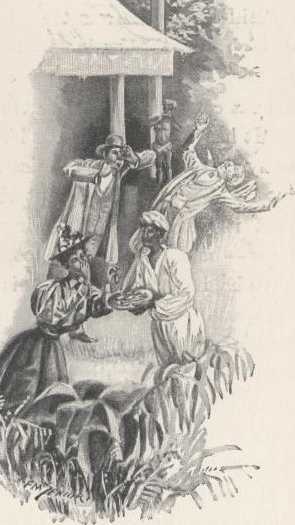I wonder if the 'dorian', if that is the name of it, is another superstition, like the peepul tree. There was a great abundance and variety of tropical fruits, but the dorian was never in evidence. It was never the season for the dorian. It was always going to arrive from Burma sometime or other, but it never did. By all accounts it was a most strange fruit, and incomparably delicious to the taste, but not to the smell. Its rind was said to exude a stench of so atrocious a nature that when a dorian was in the room even the presence of a polecat was a refreshment. We found many who had eaten the dorian, and they all spoke of it with a sort of rapture. They said that if you could hold your nose until the fruit was in your mouth a sacred joy would suffuse you from head to foot that would make you oblivious to the smell of the rind, but that if your grip slipped and you caught the smell of the rind before the fruit was in your mouth, you would faint. There is a fortune in that rind. Some day somebody will import it into Europe and sell it for cheese.
(FE)
The durian is the fruit of several tree species belonging to the genus Durio. There are 30 recognised Durio species, at least nine of which produce edible fruit, with over 100 named varieties in Indonesia, 300 in Thailand and 100 in Malaysia. Durio zibethinus is the only species available in the international market: other species are sold in their local regions.
Regarded by many people in Southeast Asia as the "king of fruits", the durian is distinctive for its large size, strong odour, and formidable thorn-covered rind. The fruit can grow as large as 30 centimetres (12 in) long and 15 centimetres (6 in) in diameter, and it typically weighs one to three kilograms (2 to 7 lb). Its shape ranges from oblong to round, the colour of its husk green to brown, and its flesh pale yellow to red, depending on the species.
Some people regard the durian as having a pleasantly sweet fragrance, whereas others find the aroma overpowering with an unpleasant odour. The smell evokes reactions from deep appreciation to intense disgust, and has been described variously as rotten onions, turpentine, and raw sewage. The persistence of its odour, which may linger for several days, has led to the fruit's banishment from certain hotels and public transportation in southeast Asia. By contrast, the nineteenth-century British naturalist, Alfred Russel Wallace, described its flesh as "a rich custard highly flavoured with almonds". The flesh can be consumed at various stages of ripeness, and it is used to flavour a wide variety of savoury and sweet desserts in southeast Asian cuisines. The seeds can also be eaten when cooked.
https://en.wikipedia.org/wiki/Durian